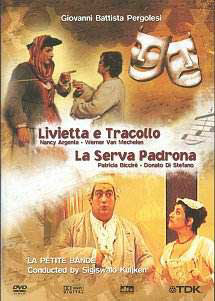Sigiswald Kuijken (better known in the UK as a violinist)
and a stooge, both camply seated on a bench on stage, hold a ten-minute
conversation about these two works which thoroughly fulfils its role
as an introduction to them. Kuijken talks incisively about the rise
of the intermezzo genre, of which these are two examples, written so
each of their 20 minute acts could be staged between the three acts
of a much longer opera seria. He values the roughness and improvised
nature of their writing: ‘they are popular, less exact, more wild. You
don’t have to look for cheap psychology – they are a very long way from
Freud.’
These qualities come across admirably in the musical
and dramatic values of the performances – most strongly of all in Livietta
e Tracollo, which is, as Kuijken remarks, far more experimental
than its companion. The distinction between recitative and aria is far
more blurred and the ‘orchestral’ parts (consisting of strings and continuo)
chug along less imaginatively, but with flashes of harmonic unconventionality
that spice the formal language with originality. These could be reasons
why it has been neglected in favour of La Serva Padrona, and
also why I prefer it to its better-known companion.
Both operas plot a bossy young woman against a powerful
but silly older man: guess who wins in the end? It doesn’t spoil the
rudimentary story line to reveal that all ends happily ever after, with
the man happily if resignedly consigned to his fate as spouse of the
other. Soleri’s productions take place against an attractive backdrop,
outdoors for Livietta, in doors for Padrona, and use a minimum of props,
which include secondary characters whose function is not to sing but
to move the action along and provide a butt for gentle humour.
The vocal lines are the most complex part of these
works, demanding considerable agility and a command of long phrases.
Argenta and van Mechelen trump the other two, making Livietta again
the more appealing work, but I suspect that the larger voices of Biccire
and di Donato are in a comparatively confined space – the Luna Theatre
seems to have hardly any resonance – and the microphones boom and compress
the sound to their detriment. All sing with easy accuracy and fine intonation
and do not make use of the breathy, white tone heard too frequently
in this repertoire. Kuijken’s stricture of ‘text first – you have to
appreciate the pleasure of the language, to make the music light enough
to fly’ is observed by all four singers, if not by the subtitler, who
adds an extra layer of comedy. Poor Kuijken is made to say at one point
‘I think, history is wrong quite rare – these serious operas were quite
academically’ and the works themselves are full of howlers, though anyone
with basic Italian will find no problem in following without the subtitles,
such is the clarity of their diction.
It’s not as easy as it looks to get such simple pieces
so right, but Kuijken and Soleri have the measure of this idiom, and
I recommend the disc.
Peter Quantrill


